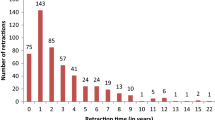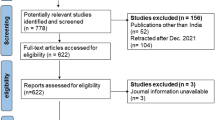Abstract
This study focuses on retraction notices from two major Latin American/Caribbean indexing databases: SciELO and LILACS. SciELO includes open scientific journals published mostly in Latin America/the Caribbean, from which 10 % are also indexed by Thomson Reuters Web of Knowledge Journal of Citation Reports (JCR). LILACS has a similar geographical coverage and includes dissertations and conference/symposia proceedings, but it is limited to publications in the health sciences. A search for retraction notices was performed in these two databases using the keywords “retracted”, “retraction” “withdrawal”, “withdrawn”, “removed” and “redress”. Documents were manually checked to identify those that actually referred to retractions, which were then analyzed and categorized according to the reasons alleged in the notices. Dates of publication/retraction and time to retraction were also recorded. Searching procedures were performed between June and December 2014. Thirty-one retraction notices were identified, fifteen of which were in JCR-indexed journals. “Plagiarism” was alleged in six retractions of this group. Among the non-JCR journals, retraction reasons were alleged in fourteen cases, twelve of which were attributed to “plagiarism”. The proportion of retracted articles for the SciELO database was approximately 0.005 %. The reasons alleged in retraction notices may be used as signposts to inform discussions in Latin America on plagiarism and research integrity. At the international level, these results suggest that the correction of the literature is becoming global and is not limited to mainstream international publications.

Similar content being viewed by others
References
Alfaro-Toloza, P., Mayta-Tristan, P., & Rodriguez-Morales, A. J. (2013). Publication misconduct and plagiarism retractions: a Latin American perspective. Current Medical Research and Opinion, 29(2), 99–100.
Amos, A. K. (2014). The ethics of scholarly publishing: Exploring differences in plagiarism and duplicate publication across nations. Journal of the Medical Library Association, 102(2), 87–91.
Anderson, M., Kot, F. C., Shaw, M. A., Lepkowski, C. C., & De Vries, R. G. (2011). Authorship diplomacy: Cross-national differences complicate allocation of credit and responsibility. American Scientist, 99(3), 204–207.
Bohannon J. (2014). Study of massive preprint archive hints at the geography of plagiarism. Science Insider. 11 December. http://tinyurl.com/q7y8hzp, Access March 2015.
Brazilian National Council for Scientific and Technological Development (CNPq). (2011). Directives for Research Integrity. http://www.cnpq.br/web/guest/diretrizes. Accessed September 2014.
Citron, D. T., & Ginsparg, P. (2015). Patterns of text reuse in a scientific corpus. PNAS, 112(1), 25–30.
Cokol, M., Ozbay, F., & Rodriguez-Esteban, R. (2008). Retraction rates are on the rise. EMBO Reports, 9(1), 2. doi:10.1038/sj.embor.7401143.
COPE (Committee on Publication Ethics) (2009). Retraction Guidelines. http://publicationethics.org/files/retraction%20guidelines.pdf. Accessed March 2015.
Corbyn, Z. (2009). Retractions up tenfold. Higher Education: Times. http://www.timeshighereducation.co.uk/407838.article. Accessed January 2014.
Fanelli, D. (2013). Why growing retractions are (mostly) a good sign. PLoS Medicine,. doi:10.1371/journal.pmed.1001563.
Fang, F., Grant, S. C. R., & Casadevall, A. (2012). Misconduct accounts for the majority of retracted scientific publications. PNAS,. doi:10.1073/pnas.1212247109.
Grieneisen, M. L., & Zhang, M. (2012). A comprehensive survey of retracted articles from the scholarly literature. PLoSOne, 7(10), e44118. doi:10.1371/journal.pone.0044118.
He, T. (2012). Retraction of global scientific publications from 2001 to 2010. Scientometrics, 96, 555–561.
Heitman, E., & Litewka, S. (2011). International perspectives on plagiarism and considerations for teaching international trainees. Urologic Oncology, 29(1), 104–108.
Huggett S. (2012). The rise of Latin American Science. Research Trends 31. http://www.researchtrends.com/issue-31-November-2012/the-rise-of-latin-american-science. Accessed Nov 2014.
LILACS- Latin American & Caribbean Literature on Health Sciences. (2010). Journal selection and permanent criteria. http://tinyurl.com/p4f6u42. Accessed January 2015.
LILACS-Latin American & Caribbean Literature on Health Sciences. (2014). http://LILACS.bvsalud.org Accessed November 2014.
Lu, S. F., Jin, G. Z, Uzzi, B., Jones, B. (2013). The retraction penalty: Evidence from the Web of Science. Scientific Reports 3(3146).
Packer, A. L. (2009). The SciELO open access: A gold way from the South. Canadian Journal of Higher Education, 39(3), 111–126.
Resnik, D. B., & Dinse, G. E. (2013). Scientific retractions and corrections related to misconduct findings. Journal of Medical Ethics, 39, 46–50.
Roig, M. (2014). Critical issues in the teaching of responsible writing. Journal of Microbiology & Biology Education, December. http://tinyurl.com/onh22oq. Accessed December 2014.
SciELO – Scientific Electronic Library Online. (2014). http://www.scielo.org. Accessed November 2014.
Steen, R. G. (2011). Retractions in the scientific literature: Is the incidence of research fraud increasing? Journal of Medical Ethics, 37(3), 249–253.
Steen, R. G., Casadevall, A., & Fang, F. C. (2013). Why has the number of scientific retractions increased? PLoS ONE, 8(7), e68397.
Stretton, S., Bramich, N. J., Keys, J. R., Monk, J. A., Ely, J. A., Haley, C., et al. (2012a). Publication misconduct and plagiarism retractions: A systematic, retrospective study. Current Medical Research and Opinion, 28, 1575–1583.
Stretton, S., Bramich, N. J., Keys, J. R., Monk, J. A., Ely, J. A., Haley, C., et al. (2012b). Publication misconduct and plagiarism retractions: A systematic, retrospective study. Current Medical Research and Opinion, 28(10), 1575–1583.
Thomson Reuters. (2014). Journal Citation Reports. http://thomsonreuters.com/journal-citation-reports. Accessed November 2014.
Van Noorden, R. (2011). The trouble with retractions. Nature, 478(7367), 26–28.
Van Noorden, R. (2013a). Brazil fêtes open-access site. Nature, 502(7472), 418.
Van Noorden, R. (2013b). Brazilian citation scheme outed. Nature, 500(7464), 510–511.
Vasconcelos, S., Leta, J., Costa, L., Pinto, A., & Sorenson, M. M. (2009). Discussing plagiarism in Latin American Science. EMBO Reports, 10(7), 677–682.
Wager, E., & Williams, P. (2011). Why and how do journals retract articles? An analysis of Medline retractions 1988–2008. Journal of Medical Ethics, 37, 567–570.
Williams, P., & Wager, E. (2013). Exploring why and how journal editors retract articles: Findings from a qualitative study. Science and Engineering Ethics, 19, 1–11.
Yilmaz, I. (2007). Plagiarism? No, we’re just borrowing better English. Nature, 449(7163), 658.
Author information
Authors and Affiliations
Corresponding author
Rights and permissions
About this article
Cite this article
Almeida, R.M.V.R., de Albuquerque Rocha, K., Catelani, F. et al. Plagiarism Allegations Account for Most Retractions in Major Latin American/Caribbean Databases. Sci Eng Ethics 22, 1447–1456 (2016). https://doi.org/10.1007/s11948-015-9714-5
Received:
Accepted:
Published:
Issue Date:
DOI: https://doi.org/10.1007/s11948-015-9714-5




